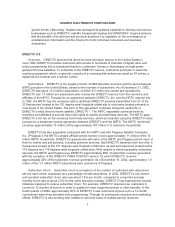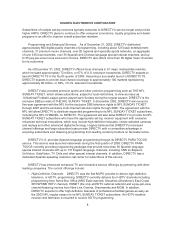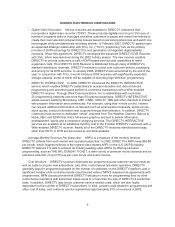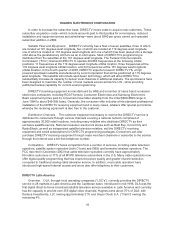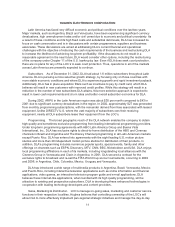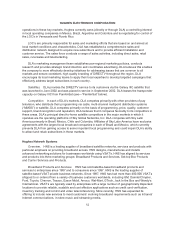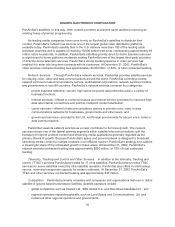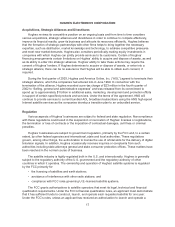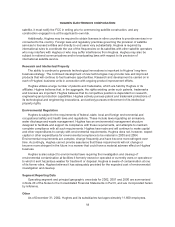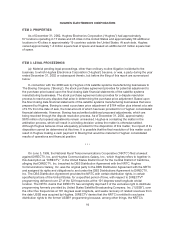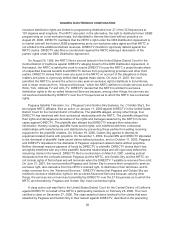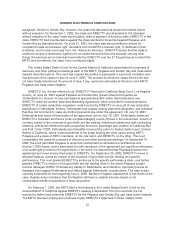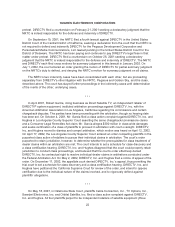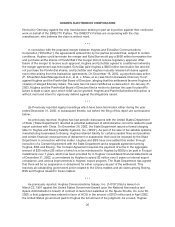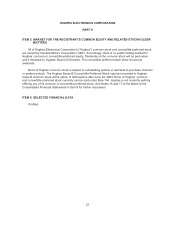DIRECTV 2002 Annual Report Download - page 27
Download and view the complete annual report
Please find page 27 of the 2002 DIRECTV annual report below. You can navigate through the pages in the report by either clicking on the pages listed below, or by using the keyword search tool below to find specific information within the annual report.HUGHES ELECTRONICS CORPORATION
Acquisitions, Strategic Alliances and Divestitures
Hughes reviews its competitive position on an ongoing basis and from time to time considers
various acquisitions, strategic alliances and divestitures in order to continue to compete effectively,
improve its financial results, grow its business and allocate its resources efficiently. Hughes believes
that the formation of strategic partnerships with other firms helps to bring together the necessary
expertise, such as distribution, market knowledge and technology, to address competitive pressures
and meet new market demands. Hughes also considers periodically making equity investments in
companies with which Hughes can jointly provide services to its customers. Certain of Hughes’
financing arrangements contain limitations on Hughes’ ability to acquire and dispose of assets, as well
as its ability to enter into strategic alliances. Hughes’ ability to take these actions may require the
consent of Hughes’ lenders. If Hughes determines to acquire or dispose of assets, or enter into a
strategic alliance, there can be no assurance that Hughes will be able to obtain such consent, if
required.
During the first quarter of 2003, Hughes and America Online, Inc. (“AOL”) agreed to terminate their
strategic alliance, which the companies had entered into in June 1999. In connection with the
termination of the alliance, Hughes recorded a pre-tax charge of $23 million in the fourth quarter of
2002 to “Selling, general and administrative expenses” and was released from its commitment to
spend up to approximately $1 billion in additional sales, marketing, development and promotion efforts
in support of certain specified products and services. Under the terms of the agreement, HNS will
continue to provide services to current bundled AOL broadband subscribers using the HNS high-speed
Internet satellite services as the companies develop a transition plan to an unbundled service.
Regulation
Various aspects of Hughes’ businesses are subject to federal and state regulation. Noncompliance
with these regulations could result in the suspension or revocation of Hughes’ licenses or registrations,
the termination or loss of contracts or the imposition of contractual damages, civil fines or criminal
penalties.
Hughes’ businesses are subject to government regulation, primarily by the FCC and, to a certain
extent, by other federal agencies and international, state and local authorities. These regulations
govern, among other things, the authorization to license the use of orbital slots for the delivery of digital
television signals. In addition, Hughes occasionally receives inquiries or complaints from such
authorities including state attorneys general and state consumer protection offices. These matters have
been resolved in the normal course of business.
The satellite industry is highly regulated both in the U.S. and internationally. Hughes is generally
subject to the regulatory authority of the U.S. government and the regulatory authority of other
countries in which it operates. The ownership and operation of Hughes’ satellite systems is regulated
by the FCC primarily for:
• the licensing of satellites and earth stations;
• avoidance of interference with other radio stations; and
• compliance with FCC rules governing U.S.-licensed satellite systems.
The FCC grants authorizations to satellite operators that meet its legal, technical and financial
qualification requirements. Under the FCC’s financial qualification rules, an applicant must demonstrate
that it has sufficient funds to construct, launch, and operate each requested satellite for one year.
Under the FCC’s rules, unless an applicant has received an authorization to launch and operate a
17


